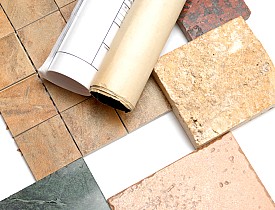Choose the Right Tile
 When planning a remodeling project, particularly in the bathroom or kitchen, the use of tile on walls, counters and floors is often a big part of the equation. As with all home-building materials, there are pros and cons to the use of tile, and it's important to be well educated on how different types of tile will work in certain applications and how to make sure that the tiled surface holds up well in the future.
When planning a remodeling project, particularly in the bathroom or kitchen, the use of tile on walls, counters and floors is often a big part of the equation. As with all home-building materials, there are pros and cons to the use of tile, and it's important to be well educated on how different types of tile will work in certain applications and how to make sure that the tiled surface holds up well in the future.
Preparation
In home remodeling, surface preparation plays an important role in determining the quality of the finished result. This is particularly true with the use of tile. The "setting bed" or "substrate" is the foundation of any tile job, and if the foundation is lacking, then the whole job will suffer for it. A strong, hard and level surface is necessary to maintain the integrity of the applied tiles.
Advantages
The pros of tiled surfaces are many. Tile prices range from very inexpensive to very expensive, but they can be mixed and matched to stretch budget dollars. There is also considerable design flexibility and room for creativity in layout and pattern. A person with decent DIY skills can install a tiled surface himself, with the right tools. Repairing broken tiles can be done on a tile-by-tile basis without the need to replace an entire surface. And finally, a tiled surface is significantly lighter than a solid surface such as quartz, Corian or granite, so there are fewer structural issues to contend with.
Disadvantages
The cons of tiled surfaces are also numerous. Individual tiles can break and chip, requiring replacement that not everyone can do himself. The grout between tiles can be stained or cracked and require replacement as well. Tile designs and layout patterns go in and out of style fairly quickly, and what is considered a trendy look today could seem hopelessly dated in only a few years.
Once you've taken the above into consideration and you are ready to shop for tiles, there are a few additional points to keep in mind:
- Break strength: This is the pounds of pressure required to break an unsupported tile. The break strength should be sufficient to withstand normal pressure and it is one of the most important considerations when selecting tile. A hard-glazed tile will have a greater break strength than a softer, porous stone.
- Water absorption: There are four levels, from impervious (less than .5% water absorption) to non-vitreous (7% or greater water absorption). The more impervious the tile, the better for the life of the tile both in terms of strength and staining.
- Scratch resistance: Test the tile for abrasion and scratch resistance. While there will always be some wear and tear on household materials, the higher the resistance, the longer you will be happy with the product.
- Coefficient of friction: This odd-sounding phrase really just means "slip factor." When wet, how slippery will the tiles become? This is a very important consideration when installing a tiled floor in a kitchen or bathroom.
- Freezing and thaw resistance: Non-resistant tiles will result in glaze that flakes off or chipped tiles.
As with all home renovation projects, taking into consideration all of the finer aspects of a particular piece of the pie will go a long way toward giving you a result you want - within the budget you have.
Looking for a Pro? Call us (866) 441-6648

Tile Contractors Experiences

Glossy New Kitchen Floor Tile … At Last!

New Kitchen Floor Tile After Water Damage



